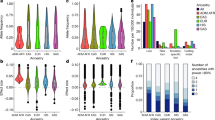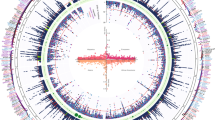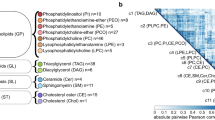Abstract
The Million Veteran Program (MVP) was established in 2011 as a national research initiative to determine how genetic variation influences the health of US military veterans. Here we genotyped 312,571 MVP participants using a custom biobank array and linked the genetic data to laboratory and clinical phenotypes extracted from electronic health records covering a median of 10.0 years of follow-up. Among 297,626 veterans with at least one blood lipid measurement, including 57,332 black and 24,743 Hispanic participants, we tested up to around 32 million variants for association with lipid levels and identified 118 novel genome-wide significant loci after meta-analysis with data from the Global Lipids Genetics Consortium (total n > 600,000). Through a focus on mutations predicted to result in a loss of gene function and a phenome-wide association study, we propose novel indications for pharmaceutical inhibitors targeting PCSK9 (abdominal aortic aneurysm), ANGPTL4 (type 2 diabetes) and PDE3B (triglycerides and coronary disease).
This is a preview of subscription content, access via your institution
Access options
Access Nature and 54 other Nature Portfolio journals
Get Nature+, our best-value online-access subscription
$29.99 / 30 days
cancel any time
Subscribe to this journal
Receive 12 print issues and online access
$209.00 per year
only $17.42 per issue
Buy this article
- Purchase on Springer Link
- Instant access to full article PDF
Prices may be subject to local taxes which are calculated during checkout






Similar content being viewed by others
Data availability
The full summary-level association data from the trans-ancestry meta-analysis for each lipid trait from this report are available through dbGaP, with accession number phs001672.v1.p1.
References
Collins, R. What makes UK Biobank special? Lancet 379, 1173–1174 (2012).
Gaziano, J. M. et al. Million Veteran Program: a mega-biobank to study genetic influences on health and disease. J. Clin. Epidemiol. 70, 214–223 (2016).
The Emerging Risk Factors Collaboration. Major lipids, apolipoproteins, and risk of vascular disease. J. Am. Med. Assoc. 302, 1993–2000 (2009).
Teslovich, T. M. et al. Biological, clinical and population relevance of 95 loci for blood lipids. Nature 466, 707–713 (2010).
Global Lipids Genetics Consortium.. Discovery and refinement of loci associated with lipid levels. Nat. Genet. 45, 1274–1283 (2013).
Chasman, D. I. et al. Forty-three loci associated with plasma lipoprotein size, concentration, and cholesterol content in genome-wide analysis. PLoS Genet. 5, e1000730 (2009).
Albrechtsen, A. et al. Exome sequencing-driven discovery of coding polymorphisms associated with common metabolic phenotypes. Diabetologia 56, 298–310 (2013).
Peloso, G. M. et al. Association of low-frequency and rare coding-sequence variants with blood lipids and coronary heart disease in 56,000 whites and blacks. Am. J. Hum. Genet. 94, 223–232 (2014).
Asselbergs, F. W. et al. Large-scale gene-centric meta-analysis across 32 studies identifies multiple lipid loci. Am. J. Hum. Genet. 91, 823–838 (2012).
Below, J. E. et al. Meta-analysis of lipid-traits in Hispanics identifies novel loci, population-specific effects, and tissue-specific enrichment of eQTLs. Sci. Rep. 6, 19429 (2016).
Liu, D. J. et al. Exome-wide association study of plasma lipids in >300,000 individuals. Nat. Genet. 49, 1758–1766 (2017).
Lu, X. et al. Exome chip meta-analysis identifies novel loci and East Asian-specific coding variants that contribute to lipid levels and coronary artery disease. Nat. Genet. 49, 1722–1730 (2017).
Sabatine, M. S. et al. Evolocumab and clinical outcomes in patients with cardiovascular disease. N. Engl. J. Med. 376, 1713–1722 (2017).
Myocardial Infarction Genetics and CARDIoGRAM Exome Consortia Investigators. Coding variation in ANGPTL4, LPL, and SVEP1 and the risk of coronary disease. N. Engl. J. Med. 374, 1134–1144 (2016).
Dewey, F. E. et al. Inactivating variants in ANGPTL4 and risk of coronary artery disease. N. Engl. J. Med. 374, 1123–1133 (2016).
Barter, P. J. et al. Effects of torcetrapib in patients at high risk for coronary events. N. Engl. J. Med. 357, 2109–2122 (2007).
Denny, J. C. et al. Systematic comparison of phenome-wide association study of electronic medical record data and genome-wide association study data. Nat. Biotechnol. 31, 1102–1111 (2013).
The TG and HDL Working Group of the Exome Sequencing Project, National Heart, Lung, and Blood Institute.. Loss-of-function mutations in APOC3, triglycerides, and coronary disease. N. Engl. J. Med. 371, 22–31 (2014).
Cohen, J. C., Boerwinkle, E., Mosley, T. H. Jr. & Hobbs, H. H. Sequence variations in PCSK9, low LDL, and protection against coronary heart disease. N. Engl. J. Med. 354, 1264–1272 (2006).
Abul-Husn, N. S. et al. Genetic identification of familial hypercholesterolemia within a single U.S. health care system. Science 354, aaf7000 (2016).
The 1000 Genomes Project Consortium. A global reference for human genetic variation. Nature 526, 68–74 (2015).
Tishkoff, S. A. et al. The genetic structure and history of Africans and African Americans. Science 324, 1035–1044 (2009).
Gusev, A. et al. Integrative approaches for large-scale transcriptome-wide association studies. Nat. Genet. 48, 245–252 (2016).
Wright, F. A. et al. Heritability and genomics of gene expression in peripheral blood. Nat. Genet. 46, 430–437 (2014).
GTEx Consortium. Genetic effects on gene expression across human tissues. Nature 550, 204–213 (2017).
Mancuso, N. et al. Integrating gene expression with summary association statistics to identify genes associated with 30 complex traits. Am. J. Hum. Genet. 100, 473–487 (2017).
Lek, M. et al. Analysis of protein-coding genetic variation in 60,706 humans. Nature 536, 285–291 (2016).
Marouli, E. et al. Rare and low-frequency coding variants alter human adult height. Nature 542, 186–190 (2017).
McLaren, W. et al. Deriving the consequences of genomic variants with the Ensembl API and SNP Effect Predictor. Bioinformatics 26, 2069–2070 (2010).
Khera, A. V. et al. Association of rare and common variation in the lipoprotein lipase gene with coronary artery disease. J. Am. Med. Assoc. 317, 937–946 (2017).
Dewey, F. E. et al. Distribution and clinical impact of functional variants in 50,726 whole-exome sequences from the DiscovEHR study. Science 354, aaf6814 (2016).
Sidore, C. et al. Genome sequencing elucidates Sardinian genetic architecture and augments association analyses for lipid and blood inflammatory markers. Nat. Genet. 47, 1272–1281 (2015).
Purcell, S. M. et al. A polygenic burden of rare disruptive mutations in schizophrenia. Nature 506, 185–190 (2014).
Diogo, D. et al. Phenome-wide association studies (PheWAS) across large “real-world data” population cohorts support drug target validation. Preprint at https://www.biorxiv.org/content/early/2017/11/13/218875 (2017).
Mahajan, A. et al. Refining the accuracy of validated target identification through coding variant fine-mapping in type 2 diabetes. Nat. Genet. 50, 559–571 (2018).
Bowden, J., Davey Smith, G. & Burgess, S. Mendelian randomization with invalid instruments: effect estimation and bias detection through Egger regression. Int. J. Epidemiol. 44, 512–525 (2015).
Klarin, D. et al. Genetic analysis in UK Biobank links insulin resistance and transendothelial migration pathways to coronary artery disease. Nat. Genet. 49, 1392–1397 (2017).
Nelson, C. P. et al. Association analyses based on false discovery rate implicate new loci for coronary artery disease. Nat. Genet. 49, 1385–1391 (2017).
Gandotra, S. et al. Perilipin deficiency and autosomal dominant partial lipodystrophy. N. Engl. J. Med. 364, 740–748 (2011).
Rani, J. et al. T2DiACoD: a gene atlas of type 2 diabetes mellitus associated complex disorders. Sci. Rep. 7, 6892 (2017).
Musunuru, K. et al. Exome sequencing, ANGPTL3 mutations, and familial combined hypolipidemia. N. Engl. J. Med. 363, 2220–2227 (2010).
Graham, M. J. et al. Cardiovascular and metabolic effects of ANGPTL3 antisense oligonucleotides. N. Engl. J. Med. 377, 222–232 (2017).
Zhang, W. & Colman, R. W. Thrombin regulates intracellular cyclic AMP concentration in human platelets through phosphorylation/activation of phosphodiesterase 3A. Blood 110, 1475–1482 (2007).
Maass, P. G. et al. PDE3A mutations cause autosomal dominant hypertension with brachydactyly. Nat. Genet. 47, 647–653 (2015).
Vandeput, F. et al. Selective regulation of cyclic nucleotide phosphodiesterase PDE3A isoforms. Proc. Natl Acad. Sci. USA 110, 19778–19783 (2013).
Bedenis, R. et al. Cilostazol for intermittent claudication. Cochrane Database Syst. Rev. 10, CD003748 (2014).
Tsuchikane, E. et al. Impact of cilostazol on restenosis after percutaneous coronary balloon angioplasty. Circulation 100, 21–26 (1999).
Shinohara, Y. et al. Cilostazol for prevention of secondary stroke (CSPS 2): an aspirin-controlled, double-blind, randomised non-inferiority trial. Lancet Neurol. 9, 959–968 (2010).
Ahmad, F. et al. Phosphodiesterase 3B (PDE3B) regulates NLRP3 inflammasome in adipose tissue. Sci. Rep. 6, 28056 (2016).
Chung, Y. W. et al. Targeted disruption of PDE3B, but not PDE3A, protects murine heart from ischemia/reperfusion injury. Proc. Natl Acad. Sci. USA 112, E2253–E2262 (2015).
Harrison, S. C. et al. Genetic association of lipids and lipid drug targets with abdominal aortic aneurysm: a meta-analysis. JAMA Cardiol. 3, 26–33 (2018).
Lu, H. et al. Hypercholesterolemia induced by a PCSK9 gain-of-function mutation augments angiotensin II-induced abdominal aortic aneurysms in C57BL/6 mice—brief report. Arterioscler. Thromb. Vasc. Biol. 36, 1753–1757 (2016).
Voight, B. F. et al. Plasma HDL cholesterol and risk of myocardial infarction: a mendelian randomisation study. Lancet 380, 572–580 (2012).
Do, R. et al. Common variants associated with plasma triglycerides and risk for coronary artery disease. Nat. Genet. 45, 1345–1352 (2013).
Loh, P. R., Palamara, P. F. & Price, A. L. Fast and accurate long-range phasing in a UK Biobank cohort. Nat. Genet. 48, 811–816 (2016).
Howie, B., Fuchsberger, C., Stephens, M., Marchini, J. & Abecasis, G. R. Fast and accurate genotype imputation in genome-wide association studies through pre-phasing. Nat. Genet. 44, 955–959 (2012).
Price, A. L. et al. Principal components analysis corrects for stratification in genome-wide association studies. Nat. Genet. 38, 904–909 (2006).
Winkler, T. W. et al. Quality control and conduct of genome-wide association meta-analyses. Nat. Protoc. 9, 1192–1212 (2014).
Hyde, C. L. et al. Identification of 15 genetic loci associated with risk of major depression in individuals of European descent. Nat. Genet. 48, 1031–1036 (2016).
Zhou, X., Carbonetto, P. & Stephens, M. Polygenic modeling with Bayesian sparse linear mixed models. PLoS Genet. 9, e1003264 (2013).
Acknowledgements
Data on patients with coronary artery disease and myocardial infarctions have been contributed by the CARDIoGRAMplusC4D investigators and the Myocardial Infarction Genetics and CARDIoGRAM Exome investigators. Both datasets were obtained online (see URLs). This research is based on data from the MVP, Office of Research and Development, Veterans Health Administration, and was supported by the Department of Veterans Affairs Cooperative Studies Program award G002. This research was also supported by three additional Department of Veterans Affairs awards (1I0101BX003340, 1I01BX003362, and 1I01CX001025) and the NIH (T32 HL007734, K01HL125751, R01HL127564). The content of this manuscript does not represent the views of the Department of Veterans Affairs or the United States Government.
Author information
Authors and Affiliations
Consortia
Contributions
Concept and design: D.K., T.L.A., S.M.D., K.C., K.-M.C., P.S.T., S.K., D.J.R., P.W.F.W., J.C. and J.M.G. Acquisition, analysis or interpretation of data: D.K., S.M.D., Y.V.S., K.C., T.M.T., J.Ho., D.R.G., S.L.D., J.L., G.M.P., M.C., A.M.S., J.Hu., H.T., J.S.L., Y.-L.H., D.J.L., C.A.E., A.H.L., J.A.L., R.C., P.N., D.S., M.V., A.B., S.P., E.D.A., B.M.N., A.N., A.V.K., J.D., K.-M.C., G.A., C.W., F.E.D., J.E.H. and D.J.C. Drafting of the manuscript: D.K. and T.L.A. Critical revision of the manuscript for important intellectual content: S.M.D., Y.V.S., K.C., P.N., C.W., J.A.L., F.E.D., S.L.D., K.-M.C., C.J.O., P.S.T., S.K., D.J.R. and P.W.W. Administrative, technical or material support: D.K., Y.V.S., K.C., J.Ho., D.R.G., S.L.D., J.A.L., Y.H., J.C., J.M.G., C.J.O., P.S.T, J.E.H., and P.W.W.
Corresponding author
Ethics declarations
Competing interests
S.K. reports grant support from Regeneron and Bayer, grant support and personal fees from Aegerion, personal fees from Regeneron Genetics Center, Merck, Celera, Novartis, Bristol-Myers Squibb, Sanofi, AstraZeneca, Alnylam, Eli Lilly and Leerink Partners, personal fees and other support from Catabasis, and other support from San Therapeutics outside the submitted work. He is also the chair of the scientific advisory board at Genomics Plc. T.M.T., A.H.L., A.B., F.E.D. and D.J.C. are employees of Regeneron Pharmaceuticals. G.A. has received consulting income from Regeneron Genetics Center, 23andMe and Helix. S.L.D. has received research grant support from the following for-profit companies through the University of Utah or the Western Institute for Biomedical Research (VA Salt Lake City’s affiliated non-profit): AbbVie Inc., Anolinx LLC, Astellas Pharma Inc., AstraZeneca Pharmaceuticals LP, Boehringer Ingelheim International GmbH, Celgene Corporation, Eli Lilly and Company, Genentech Inc., Genomic Health Inc., Gilead Sciences Inc., GlaxoSmithKline PLC, Innocrin Pharmaceuticals Inc., Janssen Pharmaceuticals Inc., Kantar Health, Myriad Genetic Laboratories Inc., Novartis International AG and PAREXEL International Corporation.
Additional information
Publisher’s note: Springer Nature remains neutral with regard to jurisdictional claims in published maps and institutional affiliations.
Supplementary information
Supplementary Text and Figures
Supplementary Figures 1–17 and Supplementary Note
Supplementary Table 9
826 independent genome-wide lipid variants (across 1,014 associations) identified with GCTA-COJO software
Supplementary Table 10
Variance explained for 444 previously mapped independent exome-wide variants, 118 novel loci identified in this study, and 826 independent lipid genome-wide variants identified on conditional analysis in this study
Supplementary Table 11
223 variants (across 223 distinct loci) used for weighted genetic risk score
Supplementary Table 12
Increase in variance explained as a function of the number of repeated measures in MVP non-Hispanic whites (for a fixed sample size of 171,314 MVP participants; only individuals with five or more measures were included)
Supplementary Table 17
Transcriptome-wide association study
Supplementary Table 18
Black-specific novel low-frequency protein-altering variants associated with lipids
Supplementary Table 19
Hispanic-specific novel low-frequency protein-altering variants associated with lipids
Supplementary Table 20
Genome-wide significant pLOF variants for lipids in the MVP discovery analysis
Supplementary Table 21
Exemplar list of 47 rare damaging mutations in PDE3B from Myocardial Infarction Genetics Consortium exome sequencing data used for coronary artery disease analysis
Supplementary Table 22
Statistically significant (P < 4.98 × 10–5) phenome-wide association results for DNA sequence variants within genes targeted by lipid-lowering medicines
Supplementary Table 23
Association of 223-variant lipid genetic risk score with abdominal aortic aneurysm (AAA) risk
Supplementary Table 30
CAD association statistics for 118 novel genome-wide significant loci in the MVP lipids GWAS
Rights and permissions
About this article
Cite this article
Klarin, D., Damrauer, S.M., Cho, K. et al. Genetics of blood lipids among ~300,000 multi-ethnic participants of the Million Veteran Program. Nat Genet 50, 1514–1523 (2018). https://doi.org/10.1038/s41588-018-0222-9
Received:
Accepted:
Published:
Issue Date:
DOI: https://doi.org/10.1038/s41588-018-0222-9
This article is cited by
-
A method to estimate the contribution of rare coding variants to complex trait heritability
Nature Communications (2024)
-
The genetic architecture of multimodal human brain age
Nature Communications (2024)
-
Integrative regulation of hLMR1 by dietary and genetic factors in nonalcoholic fatty liver disease and hyperlipidemia
Human Genetics (2024)
-
Cross-ancestry genetic architecture and prediction for cholesterol traits
Human Genetics (2024)
-
GWAS of lipids in Greenlanders finds association signals shared with Europeans and reveals an independent PCSK9 association signal
European Journal of Human Genetics (2024)



